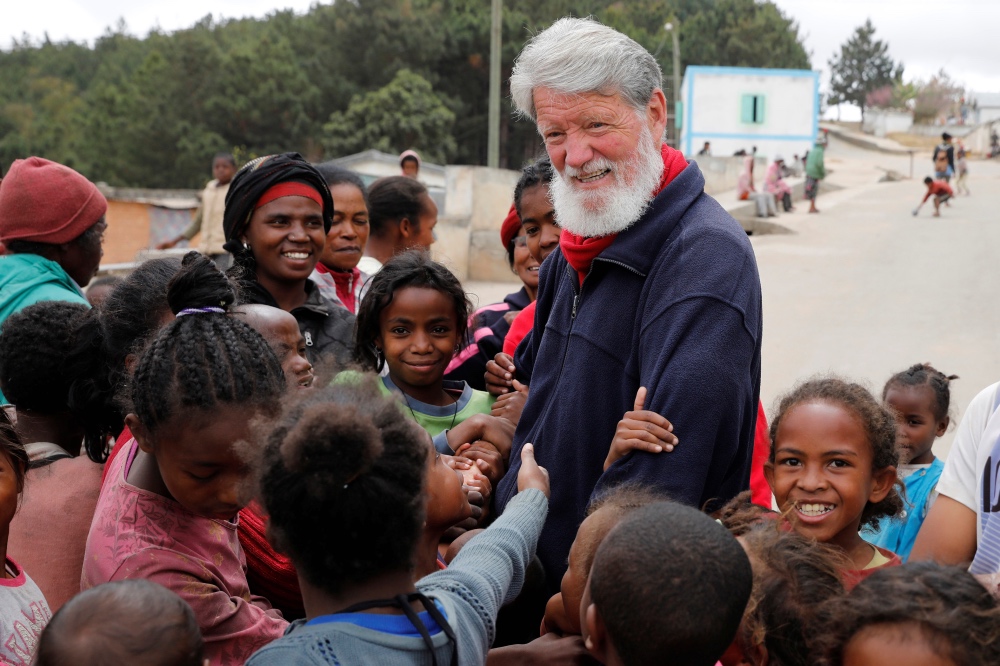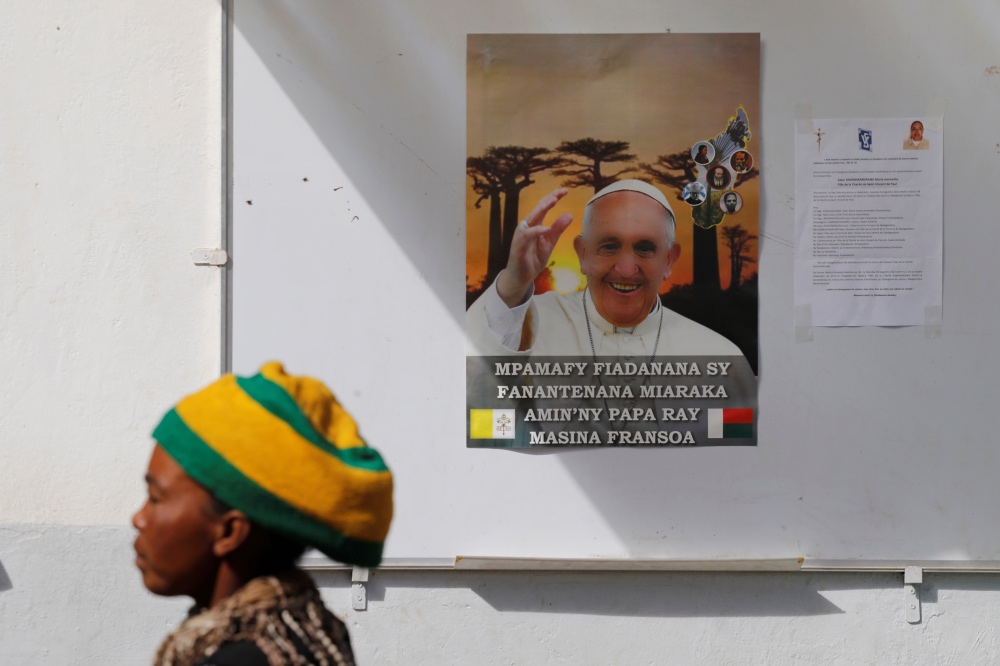Antananarivo, Madagascar
Reuters
Three times a year, Father Pedro Opeka celebrates Mass in a vast grey quarry in the hills above Madagascar’s capital. This week, he will welcome his old teacher, Pope Francis, to see the chiselled granite altar from where he ministers.
Opeka studied theology under the future pope in their native Argentina before dedicating his life to building communities for the families of Madagascar, one of the world’s poorest nations.
“The Pope is coming to tell people to keep fighting for those who are forgotten,” he said. “The Pope will comfort them.”

Catholic minister father Pedro Opeka meets children who are housed by his aid organisation at the Akamasoa community in Antananarivo, Madagascar, on 27th August. PICTURE: REUTERS/Baz Ratner
Over the last 50 years, an organisation founded by Opeka has built homes for 25,000 people, 100 schools, six clinics and two football stadiums. Next year they will build a college for paramedics.
Much of the stone for the buildings is quarried just outside the capital city Antananarivo, from the huge granite pit where Opeka holds Mass for 10,000 people. Opeka, the son of a mason, refers to the pit as his cathedral.

A woman walks past a portrait of Pope Francis at the Akamasoa community in Antananarivo, Madagascar, on 27th August. PICTURE: Reuters/Baz Ratner
POPE FRANCIS TO VISIT MOZAMBIQUE, MADAGASCAR AND MAURITIUS
Pope Francis will visit Mozambique, Madagascar and Mauritius from 4th to 10th September. Following are some of the highlights of his second trip to sub-Saharan Africa:
MOZAMBIQUE (4th to 6th September)
In Mozambique the Pope’s theme for his Africa trip, as a “pilgrim of hope, peace and reconciliation”, is especially relevant. In August, the government and Renamo, a former guerrilla movement turned main opposition party, signed a peace agreement to formally end decades of often deadly hostilities. During the last papal visit, by Pope John Paul in 1988, the civil war was still raging. More than one million people were killed before a 1992 ceasefire ended the worst of the bloodshed. Pope Francis will meet with the government, civil society leaders and diplomats, ahead of an election next month that will be the first test of the peace treaty. Mozambique is still recovering from two back-to-back cyclones, which killed more than 1,000 people in the region six months ago. Francis will not be visiting Beira, the city hardest hit by the storms.
MADAGASCAR (6th to 9th September)
In Madagascar, the Pope will meet with President Andry Rajoelina, who took office in January after a closely contested election.
The Indian Ocean island state is one of Africa’s poorest nations, with more than 90 per cent of its 25 million people living on less than $US2 per day, according to the World Food Programme. Around half the population follow indigenous beliefs while around 40 per cent are Christians. About half of those are Catholic. The Pontiff will deliver a homily in the monastery of an order of cloistered Carmelite nuns. The Carmelites trace their roots to Mount Carmel in modern day Israel, where they came as pilgrims in the 12th century. The order arrived in Madagascar in 1921. He will also visit the tomb of Blessed Victoire Rasoamanarivo, a Malagasy woman who lived in the second half of the 19th century and converted to Catholicism from animism at the age of 15 despite the violent opposition of her family. She was married off two years later to the son of the Prime Minister, described as a violent drunk. When foreign missionaries were expelled in 1883 during the Franco-Malagasy war, she confronted armed soldiers to lead Catholics into locked churches to pray. Later she devoted herself to lepers, the poor and sick. She was beatified in 1989, putting her one step away from sainthood. The Pope will also celebrate a Sunday Mass and lead prayers in several communities in the capital Antananarivo, including one established by his former student Father Pedro Opeka, a priest whose organisation has built homes for 25,000 poor people.
MAURITIUS (9th September)
The Pope will spend a day in Port Louis, the capital of Mauritius, a small island state known for its beaches and tax treaties that anti-poverty campaigners say drain the wealth from developing nations. About a quarter of its 1.4 million people are Catholic. Francis will pray at a shrine dedicated to Blessed Jacques-Désiré Laval, a French doctor turned priest who arrived in Port Louis in 1841 and devoted his life to caring for former slaves in what was then a British colony. Francis will also celebrate Mass at a monument to the Virgin Mary.
– MAGGIE FICK and HEREWARD HOLLAND in Nairobi and EMMA RUMNEY in Johannesburg, Reuters.
“In Europe a cathedral is built on the ground,” the 71-year-old missionary said. “Akamasoa cathedral was dug by hand.”
Pope Francis, the 82-year-old leader of the world’s 1.3 billion Roman Catholics, is visiting Mozambique, Madagascar and Mauritius during his six-day trip to Africa this week.
On 8th September, he will meet some of the families whose lives have been changed by Opeka, whose Slovenian parents fled to Argentina before he was born because the Communists tried to kill his father for being Christian.
Opeka invited Francis to visit during a meeting at the Vatican last year, never dreaming that he would accept.
Ratsiory Fanomezanjanahary Tsiadino Fannie, a 13-year-old budding mathematician, lives in one of the homes Opeka has carved from the hillside and is due to meet Francis.
Her pastel green house sits on one side of a leafy courtyard where she plays hopscotch with her six siblings, a stone’s throw from Opeka’s own house in the hillside neighbourhood of Akamasoa.
Asked if she was looking forward to next week, she broke into a smile.
“There will be my exams,” Fannie said. “I’m ready.”
Following a prod from her mother Erlinne, she gasped: “Oh yeah, the arrival of the Pope as well? I’m also ready for the arrival of the Pope. I’m really happy.”
Erlinne, a single mother of four children, has also adopted her brother’s two orphans, and taken in another child.
Struggling to find work in the countryside, she moved to Akamasoa, one of the 20 neighbourhoods that Opeka’s organisation helped build, with her children seven years ago.
She was given a house and a job in a school canteen. Her children are all studying.
“I, who was at the bottom at everything, will see my daughter talking to the Pope,” she said, tears welling up. “My heart is full of joy.”
Trained by his father, Opeka built his first wall at 14 and his first home for the poor at 17. He joined a Catholic mission to Madagascar at 22, when he met 800 families living in and around Antananarivo’s municipal rubbish dump. During sleepless nights, he prayed for guidance to ease their suffering.
“I heard people looking for help, shouting for it, but politicians didn’t hear them,” said Opeka. “We have to go where there is a need.”
A member of the Lazarist or Vincentian order of priests, founded to minister to the rural poor, he created the Akamasoa Association to build and run the villages using donations from around the world. His work has earned him the Legion of Honour, France’s highest order of merit.
The straight-talking priest has no time for the bureaucracy and perks of many international aid agencies.
“I don’t want to waste my time filling out paperwork,” he said. “We can beat poverty and we have to beat poverty. Not with words, conferences, or international meetings, but with the poor.”
Residents of neighbourhoods built by the association earn around 50,000 ariary ($US13) per week in exchange for breaking rocks by hand and building stone walls. They are given a house which they rent at a negligible rate, depending on their circumstances.
The neat rows of candy-coloured houses and cobblestone streets streak the hillside around the quarry, surrounded by dark pine trees.
“We make our city beautiful,” Opeka said firmly. “Beauty is not a privilege for the rich.”




